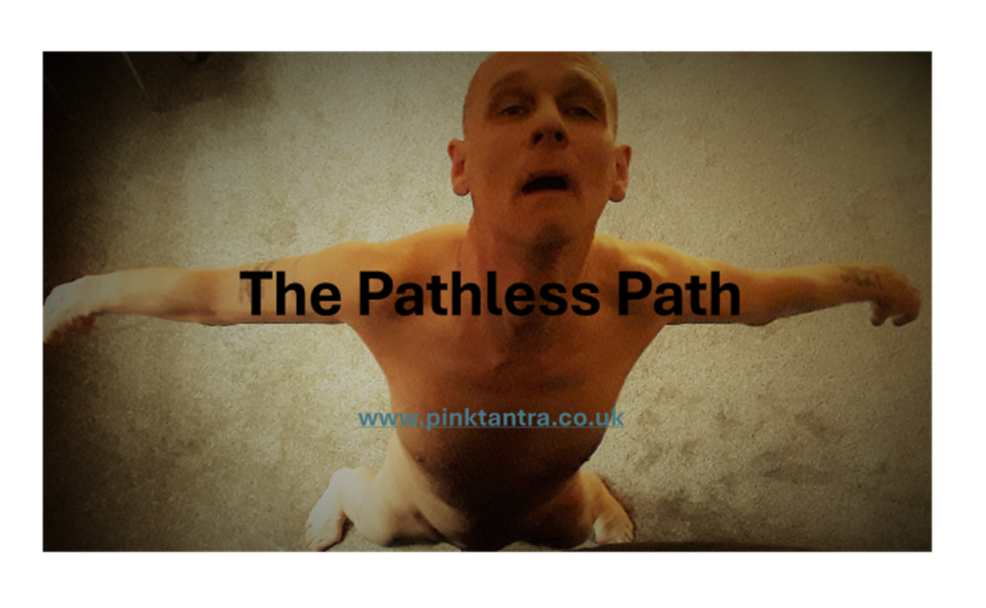The Pathless Path
The Pathless Path is the path of effortless effort, “This is the whole method of Tilopa, and the whole method of Tantra: without making an effort – because if you make an effort, the ego is strengthened. If you make and effort, 'you' come in.”
 I’ve been flicking through OSHO’s Tantra: Supreme Understanding in preparation for T4GM book club in March, and it struck me how relevant this is to much of the direction of spiritual teaching today. When we think of people like Adyashanti, Rupert Spira and Christopher Wallis, they all offer alternatives to the Direct Path, the Pathless Path, the path OSHO advocates in chapter 7 of his book.
I’ve been flicking through OSHO’s Tantra: Supreme Understanding in preparation for T4GM book club in March, and it struck me how relevant this is to much of the direction of spiritual teaching today. When we think of people like Adyashanti, Rupert Spira and Christopher Wallis, they all offer alternatives to the Direct Path, the Pathless Path, the path OSHO advocates in chapter 7 of his book.
The Pathless Path is different from the Gradual Path, what OSHO, after Tilopa, calls the path of the warrior (the gradual path) and the royal path (the pathless path). In the gradual path we progress bit by bit, or to use the warrior analogy, we fight inch by inch. This OSHO says is the path of yoga, which creates conflict within you. It is based on habits, where thinking is not needed, and neither is awareness.
However, for awakening we need awareness, full awareness. “Tantra says you have to flower into a perfectly awakened being, not a robot-like mechanism.” So, in the Pathless Path we go straight to the you, the ‘I’, posing the question Who Am I? By doing so we come to see, in the royal path, that there is no you, there is no-one above you, there is no-one. There is no ‘I’.
Although rather than pose the question Who am I? Christopher Wallis offers alternatives that might be better suited to our Western minds, such as What is Me? What is meant by I? What is it that knows and is aware of my experience? What is awareness? These questions, Wallis suggests, can help us shift beyond the mind, through our self-reflective capacity (which is experiential and not mental) to bypass the finite mind (which is consciousness entangled with experience). Otherwise, we can get caught up in the stories we attach to the ‘I’.
Yoga, OSHO says, sets us up to run these stories, built on what is good rather than bad, cultivating non-violence rather than violence, etc, etc. Tantra, OSHO says, teaches us to accept both “and through the acceptance of both, transcendence happens” or as Tilopa says, “To transcend duality is the kingly view.”
This is similar to what Adyashanti means when he says, once we recognise we are consciousness and let go of our attachment to thing-ness we stop doing, we stop making an effort. We abide in the stillness, that is, let everything be as it already is. We stop trying to control or manipulate our experience. We stop fixating, trying to understand, conceptualising. We surrender all separateness.
Once we have lost attachment to the personal ‘I’ true embodiment can then occur, that is, the continual stripping away of all remnants of attachment and ego. Embodiment then is the realisation that every manifestation is your true body. Or as Christopher Wallis and Rupert Spira put it in their dialogue, “when speaking of embodiment, we are referring to the body in consciousness, not consciousness in the body, moving from what appears (to) consciousness, to what appears (in) consciousness, and then to what appears (as) consciousness. This is moving from the neti-neti, I am not my body, to Iti-Iti, I am this body, I am everything.”
Brining it all together
As Tilopa says in the Song of Mahamudra, “you remain loosely in the natural state”. Returning, not to some chased after altered state, living off in the jungle or in a cave, but to our natural state in our day-to-day life as a manifested embodiment of the divine (impersonal, infinite awareness – or Being Aware), which we can’t articulate in words, through the mind (see Samadhi of Silence). This is the supreme understanding. Where the ‘I’ disappears and only ‘is-ness’ remains.
Connect on Twitter / Facebook / JustFor.Fans
Email me direct if you are interested in mindful, embodied, trauma-informed, or spiritually-informed coaching, or if you would like to join my new Pink Tantra Towards Awakening group for chat rooms, video channels and in-person workshops around tantra and intimacy practices robert.pinktantra@gmail.com
See my personal development / personality profiling book DISCover the Power of You published through John Hunt Publishing Ltd, 2017. ISBN: 978-1-78535-591-2
And for those who enjoy historical fiction, stories of underrepresented life’s, see my first novel Fermented Spirits published through Austin Macauley Publishers, 2022. ISBN-13: 978-1398437159